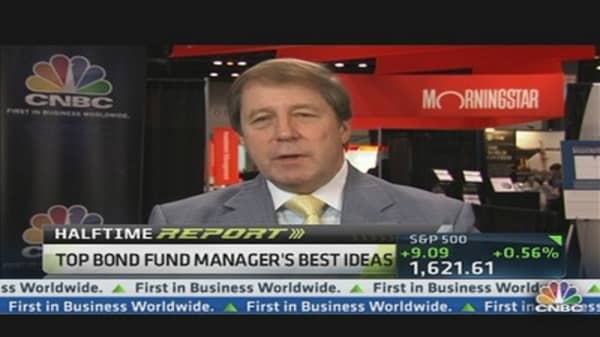A recent investment industry trade report noted that roughly half of all U.S. financial advisors had increased exposure to emerging market bond portfolios this year. And wouldn't you know it, emerging market bond funds are down 10 percent since the beginning of May.
As investors and financial advisors have extended credit risk to make up for the relatively unattractive U.S. bond market, high-yield bonds and emerging market bonds, in particular, have been attracting a majority of the bond fund flows.
Vanguard Group recently had to close a high-yield bond fund to new investors because of the flood of assets into the fund. Mutual fund companies are not showing any signs of slowing down in marketing more exotic bond portfolios, either.
A Legg Mason fund official told CNBC on Thursday that emerging market bond funds are the place to be. Vanguard, considered the "investor's best friend" among more marketing-oriented mutual fund companies, launched its first emerging market bond fund last week.
(Read more: Bond Funds Start Ugly Dog Contest)
With emerging market bond funds down 10 percent in the past month and a half, is this really the time to be jacking up exposure to a volatile asset class?
Yes, and no.
There is always a place for global diversification in a bond portfolio. In fact, a bond portfolio should be properly diversified regardless of where the "hot" money is going.
It should also be diversified based on your age, risk horizon and financial needs. But the recent turmoil in the bond markets coupled with the prevailing trend among investors to stretch for yield could make an investor lose sight of these primary investment decision-making triggers.
"You live by the sword, you die by the sword," said financial advisor Rick Ferri, founder of Portfolio Solutions. Ferri said advisors who think they can pick sectors are advisors whom clients should leave.
And bonds are slaying investors and likely giving grief to yield-chasing financial advisors right now. Investors pulled out record amounts from high-yield and emerging-market debt funds in the past week, according to new data from Lipper. A continued exodus from high-yield products drove the redemptions; high-yield mutual funds and ETFs pushed out $3.3 billion for the week. Yet investors continued to allocate new cash to bank loan products, adding $1.4 billion.
(Read more: Even Skilled Investors Can Use a Financial Advisor)
For investors unsettled by the unrest in the bond markets and the performance slide in emerging market bonds in particular, here are five questions you need to ask your advisor, and of yourself. You'll probably find that amid volatility, reverting to core principles of investing and risk are the best benchmark for action.
1. Should I shorten up on bond duration or just sell everything?
Investors are shortening up on bond duration, and as Bob Pisani pointed out in a blog post on Thursday, there's a quantifiable explanation: The iShares Barclays 1-3 Year Credit Bond Fund (CSJ), a short-term corporate bond ETF, has dropped much less than the iShares 10 Year Credit Bond Fund (CLY), a long-term corporate bond ETF.
The CLY has dropped 9 percent since May 1, the CSJ only 0.4 percent. The downside: Very little potential for appreciation and tiny yields—about 1.4 percent in the case of the CSJ. Some financial advisors prefer a strategy of replacing bonds entirely, and point to the fact that the yield on short-duration bond funds is not any better than the yield on some bank CD products.
If you're shortening up on duration, the real question is, what is duration of your liabilities? Will you be retiring 20 years from now or are you 80 years old? The duration of your liabilities should dictate whether you should fear current volatility in bond market.
(Read more: Millennials Make Most of Massive Inheritance)
Do you need money now or in the next year? Then you shouldn't have had so much risk in your bond portfolio to begin with. If you have kids going to college next year or a wedding to pay for or a tax liability, you would have good reason to be concerned, but you should have been concerned much earlier.
2. What about the bank loan asset class?
Senior bank loans may sound like they are investment grade bond risk, but to many financial advisors, like Ferri, they are just junk bonds by another name. "It's a fallacy to think that buying a bank loan fund is a way to get a safer, higher-yield investment," he said.
The bank loan funds don't have the interest rate risk that continues to be tied to the quantitative easing talk—talk about QE being ended. But consider this: The much-feared inflation that was supposed to occur with QE has not happened, and interest rates don't necessarily go higher if there is no rise in inflation, Ferri said.
Allan Roth, founder of Wealth Logic, said: "Top economists have less than a 50 percent track record in predicting rates. … Experts' ability to time rates is horrible.The bottom line is we don't know."
"Interest rates have already gone up. The question is, where are they going from here? You don't know," Ferri said.
(Read more: Understanding Financial Advisor Fee Models)




